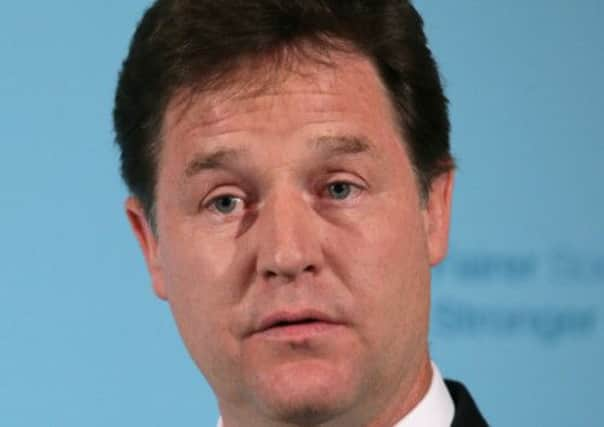Clegg gave backing for move to destroy data


The Deputy Prime Minister was “keen to protect” the newspaper’s freedom to publish while safeguarding national security, his spokesman said.
Mr Clegg, the MP for Sheffield Hallam, agreed to the move on the understanding that destruction of the material would not impinge on The Guardian’s ability to publish articles, he added.
Advertisement
Hide AdAdvertisement
Hide AdIt has emerged that Cabinet Secretary Sir Jeremy was directed by Prime Minister David Cameron, backed by Mr Clegg, to contact The Guardian about classified material handed over by the American fugitive Edward Snowden.
A spokesman for the Deputy Prime Minster said: “We understand the concerns about recent events, particularly around issues of freedom of the press and civil liberties. The independent reviewer of terrorism legislation is already looking into the circumstances around the detention of David Miranda and we will wait to see his findings.
“On the specific issue of records held by The Guardian, the Deputy Prime Minister thought it was reasonable for the Cabinet Secretary to request that The Guardian destroyed data that would represent a serious threat to national security if it was to fall into the wrong hands.
“The Deputy Prime Minister felt this was a preferable approach to taking legal action. He was keen to protect The Guardian’s freedom to publish, whilst taking the necessary steps to safeguard security.
Advertisement
Hide AdAdvertisement
Hide Ad“It was agreed to on the understanding that the purpose of the destruction of the material would not impinge on The Guardian’s ability to publish articles about the issue, but would help as a precautionary measure to protect lives and security.”
The intervention ordered by Number 10 came to light following the detention at Heathrow Airport under terror laws of David Miranda, the partner of Guardian journalist Glenn Greenwald who has worked with Snowden on a series of security services exposes.
Mr Miranda was detained under Schedule 7 of the Terrorism Act 2000 as he changed planes on a journey from Berlin to his home in Brazil.
He claimed he was held for nine hours by agents, who questioned him about his “entire life” and took his “computer, video game, mobile phone, my memory card – everything”.
Advertisement
Hide AdAdvertisement
Hide AdScotland Yard and the Home Office have insisted the actions of officers at the airport were proper.
Nevertheless, the police watchdog has said it is dealing with 45 complaints about other cases involving the terror laws used to detain Mr Miranda, although the Independent Police Complaints Commission revealed that no complaint has been received about the decision to stop Mr Miranda.
Schedule 7 of the Port and Border Controls section under the Terrorism Act 2000 allows UK police, immigration or customs staff to stop, question and detain anyone passing through ports, airports and international rail stations. A passenger can be questioned for up to nine hours.
Unlike under other terrorism prevention laws, Schedule 7 allows an officer to detain and question people “whether or not he has grounds for suspecting” any terrorist activity.
Advertisement
Hide AdAdvertisement
Hide AdOfficers are expected to use Schedule 7 to determine whether or not the person held is a terrorist, has engaged in any terrorist activity or is likely to do so in the future. They may also seize any property held by the individual, although this must be returned after seven days. Any data obtained can be downloaded and held by police for longer.
A person held could be liable for up to three months’ imprisonment if he or she “wilfully obstructs, or seeks to frustrate, a search or examination under” the schedule.
Home Secretary Theresa May has confirmed she had been briefed in advance about the possible detention of Mr Miranda.
Lawyers for Mr Miranda have written to Mrs May and Met Police commissioner Sir Bernard Hogan-Howe challenging the legality of the decision to detain him for nine hours using Schedule 7.